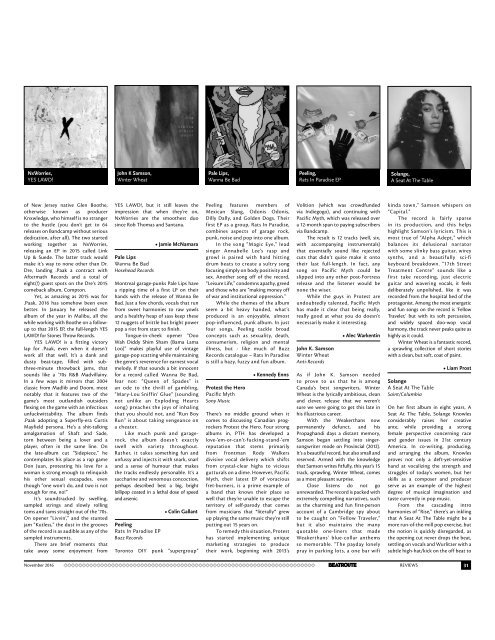BeatRoute Magazine B.C. print e-edition - November 2016
BeatRoute Magazine is a monthly arts and entertainment paper with a predominant focus on music – local, independent or otherwise. The paper started in June 2004 and continues to provide a healthy dose of perversity while exercising rock ‘n’ roll ethics.
BeatRoute Magazine is a monthly arts and entertainment paper with a predominant focus on music – local, independent or otherwise. The paper started in June 2004 and continues to provide a healthy dose of perversity while exercising rock ‘n’ roll ethics.
Create successful ePaper yourself
Turn your PDF publications into a flip-book with our unique Google optimized e-Paper software.
NxWorries,<br />
YES LAWD!<br />
John K Samson,<br />
Winter Wheat<br />
Pale Lips,<br />
Wanna Be Bad<br />
Peeling,<br />
Rats In Paradise EP<br />
Solange,<br />
A Seat At The Table<br />
of New Jersey native Glen Boothe,<br />
otherwise known as producer<br />
Knxwledge, who himself is no stranger<br />
to the hustle (you don’t get to 64<br />
releases on Bandcamp without serious<br />
dedication, after all). The two started<br />
working together as NxWorries,<br />
releasing an EP in 2015 called Link<br />
Up & Suede. The latter track would<br />
make it’s way to none other than Dr.<br />
Dre, landing .Paak a contract with<br />
Aftermath Records and a total of<br />
eight(!) guest spots on the Dre’s 2015<br />
comeback album, Compton.<br />
Yet, as amazing as 2015 was for<br />
.Paak, <strong>2016</strong> has somehow been even<br />
better. In January he released the<br />
album of the year in Malibu, all the<br />
while working with Boothe on a followup<br />
to that 2015 EP, the full-length YES<br />
LAWD! for Stones Throw Records.<br />
YES LAWD! is a fitting victory<br />
lap for .Paak, even when it doesn’t<br />
work all that well. It’s a dank and<br />
dusty beat-tape, filled with subthree-minute<br />
throwback jams, that<br />
sounds like a ‘70s R&B Madvillainy.<br />
In a few ways it mirrors that 2004<br />
classic from Madlib and Doom, most<br />
notably that it features two of the<br />
game’s most outlandish outsiders<br />
flexing on the game with an infectious<br />
unfuckwittability. The album finds<br />
.Paak adopting a Superfly-era Curtis<br />
Mayfield persona. He’s a shit-talking<br />
amalgamation of Shaft and Sade,<br />
torn between being a lover and a<br />
player, often in the same line. On<br />
the late-album cut “Sidepiece,” he<br />
contemplates his place as a rap game<br />
Don Juan, protesting his love for a<br />
woman is strong enough to relinquish<br />
his other sexual escapades, even<br />
though “one won’t do, and two is not<br />
enough for me, no!”<br />
It’s soundtracked by swelling,<br />
sampled strings and slowly rolling<br />
toms and tams straight out of the ‘70s.<br />
On opener “Livvin’,” and the stunted<br />
jam “Kutless,” the dust in the grooves<br />
of the record is as audible as any of the<br />
sampled instruments.<br />
There are brief moments that<br />
take away some enjoyment from<br />
YES LAWD!, but it still leaves the<br />
impression that when they’re on,<br />
NxWorries are the smoothest duo<br />
since Rob Thomas and Santana.<br />
<br />
Pale Lips<br />
Wanna Be Bad<br />
Hosehead Records<br />
<br />
Montreal garage-punks Pale Lips have<br />
a ripping time of a first LP on their<br />
hands with the release of Wanna Be<br />
Bad. Just a few chords, vocals that run<br />
from sweet harmonies to raw yowls<br />
and a healthy heap of sass keep these<br />
12 nuggets of brittle but bright power<br />
pop a riot from start to finish.<br />
Tongue-in-cheek opener “Doo<br />
Wah Diddy Shim Sham (Bama Lama<br />
Loo)” makes playful use of vintage<br />
garage-pop scatting while maintaining<br />
the genre’s reverence for earnest vocal<br />
melody. If that sounds a bit innocent<br />
for a record called Wanna Be Bad,<br />
fear not: “Queen of Spades” is<br />
an ode to the thrill of gambling,<br />
“Mary-Lou Sniffin’ Glue” (sounding<br />
not unlike an Exploding Hearts<br />
song) preaches the joys of inhaling<br />
that you should not, and “Run Boy<br />
Run” is about taking vengeance on<br />
a cheater.<br />
Like much punk and garagerock,<br />
the album doesn’t exactly<br />
swell with variety throughout.<br />
Rather, it takes something fun and<br />
unfussy and injects it with snark, snarl<br />
and a sense of humour that makes<br />
the tracks endlessly personable. It’s a<br />
saccharine and venomous concoction,<br />
perhaps described best a big, bright<br />
lollipop coated in a lethal dose of speed<br />
and arsenic.<br />
<br />
<br />
Peeling<br />
Rats In Paradise EP<br />
Buzz Records<br />
Toronto DIY punk “supergroup”<br />
Peeling features members of<br />
Mexican Slang, Odonis Odonis,<br />
Dilly Dally, and Golden Dogs. Their<br />
first EP as a group, Rats In Paradise,<br />
combines aspects of garage rock,<br />
punk, noise and pop into one album.<br />
In the song “Magic Eye,” lead<br />
singer Annabelle Lee’s rasp and<br />
growl is paired with hard hitting<br />
drum beats to create a sultry song<br />
focusing simply on body positivity and<br />
sex. Another song off of the record,<br />
“Leisure Life,” condemns apathy, greed<br />
and those who are “making money off<br />
of war and institutional oppression.”<br />
While the themes of the album<br />
seem a bit heavy handed, what’s<br />
produced is an enjoyable, almost<br />
pop-influenced, punk album. In just<br />
four songs, Peeling tackle broad<br />
concepts such as sexuality, death,<br />
consumerism, religion and mental<br />
illness, but - like much of Buzz<br />
Records catalogue – Rats In Paradise<br />
is still a hazy, fuzzy and fun album.<br />
<br />
Protest the Hero<br />
Pacific Myth<br />
Sony Music<br />
<br />
There’s no middle ground when it<br />
comes to discussing Canadian progrockers<br />
Protest the Hero. Four strong<br />
albums in, PTH has developed a<br />
love-‘em-or-can’t-fucking-stand-‘em<br />
reputation that stems primarily<br />
from frontman Rody Walkers<br />
divisive vocal delivery which shifts<br />
from crystal-clear highs to vicious<br />
gutturals on a dime. However, Pacific<br />
Myth, their latest EP of voracious<br />
fret-burners, is a prime example of<br />
a band that knows their place so<br />
well that they’re unable to escape the<br />
territory of self-parody that comes<br />
from musicians that *literally* grew<br />
up playing the same music they’re still<br />
putting out 15 years on.<br />
To remedy this situation, Protest<br />
has started implementing unique<br />
marketing strategies to produce<br />
their work, beginning with 2013’s<br />
Volition (which was crowdfunded<br />
via Indiegogo), and continuing with<br />
Pacific Myth, which was released over<br />
a 12-month span to paying subscribers<br />
via Bandcamp.<br />
The result is 12 tracks (well, six,<br />
with accompanying instrumentals)<br />
that essentially sound like rejected<br />
cuts that didn’t quite make it onto<br />
their last full-length. In fact, any<br />
song on Pacific Myth could be<br />
slipped into any other post-Fortress<br />
release and the listener would be<br />
none the wiser.<br />
While the guys in Protest are<br />
undoubtedly talented, Pacific Myth<br />
has made it clear that being really,<br />
really good at what you do doesn’t<br />
necessarily make it interesting.<br />
<br />
John K. Samson<br />
Winter Wheat<br />
Anti-Records<br />
<br />
As if John K. Samson needed<br />
to prove to us that he is among<br />
Canada’s best songwriters, Winter<br />
Wheat is the lyrically ambitious, clean<br />
and clever, release that we weren’t<br />
sure we were going to get this late in<br />
his illustrious career.<br />
With the Weakerthans now<br />
permanently defunct, and his<br />
Propaghandi days a distant memory,<br />
Samson began settling into singersongwriter<br />
mode on Provincial (2012).<br />
It’s a beautiful record, but also small and<br />
reserved. Armed with the knowledge<br />
that Samson writes fitfully, this year’s 15<br />
track, sprawling, Winter Wheat, comes<br />
as a most pleasant surprise.<br />
Close listens do not go<br />
unrewarded. The record is packed with<br />
extremely compelling narratives, such<br />
as the charming and fun first-person<br />
account of a Cambridge spy about<br />
to be caught on “Fellow Traveler,”<br />
but it also maintains the many<br />
quotable one-liners that made<br />
Weakerthans’ blue-collar anthems<br />
so memorable. “The payday lonely<br />
pray in parking lots, a one bar wifi<br />
kinda town,” Samson whispers on<br />
“Capital.”<br />
The record is fairly sparse<br />
in its production, and this helps<br />
highlight Samson’s lyricism. This is<br />
most true of “Alpha Adept,” which<br />
balances its delusional narrator<br />
with some slinky bass guitar, wirey<br />
synths, and a beautifully sci-fi<br />
keyboard breakdown. “17th Street<br />
Treatment Centre” sounds like a<br />
first take recording, just electric<br />
guitar and wavering vocals, it feels<br />
deliberately unpolished, like it was<br />
recorded from the hospital bed of the<br />
protagonist. Among the most energetic<br />
and fun songs on the record is ‘Fellow<br />
Traveler,’ but with its soft percussion,<br />
and widely spaced doo-wop vocal<br />
harmony, the track never peaks quite as<br />
highly as it could.<br />
Winter Wheat is a fantastic record,<br />
a sprawling collection of short stories<br />
with a clean, but soft, coat of paint.<br />
<br />
<br />
Solange<br />
A Seat At The Table<br />
Saint/Columbia<br />
On her first album in eight years, A<br />
Seat At The Table, Solange Knowles<br />
considerably raises her creative<br />
ante, while providing a strong<br />
female perspective concerning race<br />
and gender issues in 21st century<br />
America. In co-writing, producing,<br />
and arranging the album, Knowles<br />
proves not only a deft-yet-sensitive<br />
hand at vocalizing the strength and<br />
struggles of today’s women, but her<br />
skills as a composer and producer<br />
serve as an example of the highest<br />
degree of musical imagination and<br />
taste currently in pop music.<br />
From the cascading intro<br />
harmonies of “Rise,” there’s an inkling<br />
that A Seat At The Table might be a<br />
more run-of-the-mill pop exercise, but<br />
the notion is quickly disregarded, as<br />
the opening cut never drops the beat,<br />
settling on vocals and Wurlitzer with a<br />
subtle high-hat/kick on the off beat to<br />
<strong>November</strong> <strong>2016</strong> REVIEWS<br />
31


















